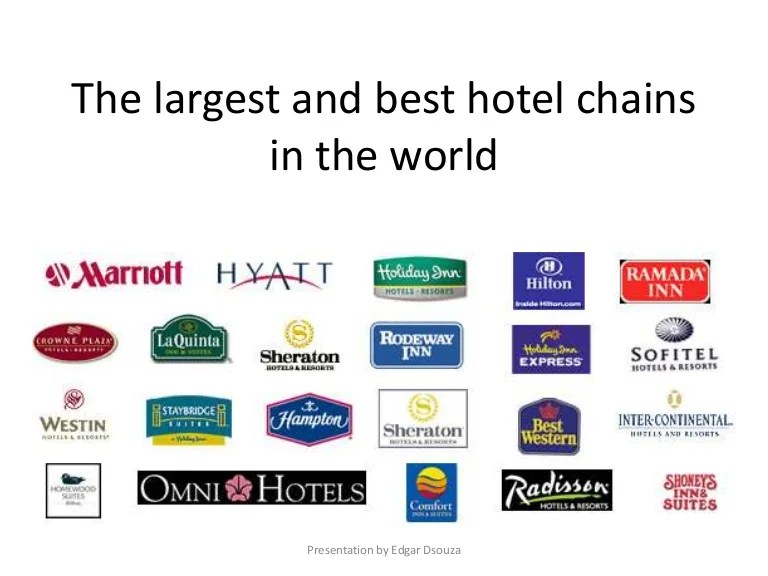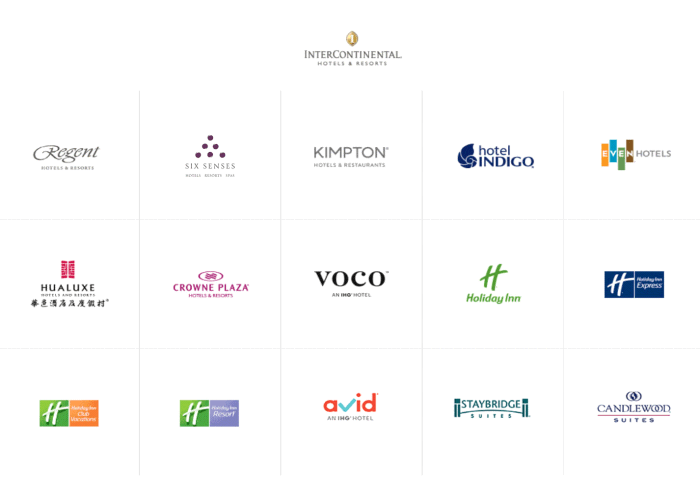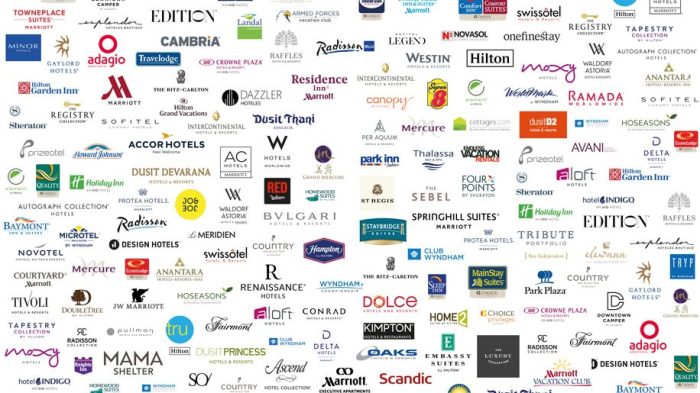In the realm of hospitality, chain brand hotels stand as beacons of recognition and reputation, offering travelers a consistent and reliable experience. From the moment guests step through their doors, these establishments strive to create memorable stays that foster loyalty and drive success.
Chain brand hotels navigate a competitive landscape, leveraging market segmentation and technology to differentiate themselves and cater to diverse guest preferences. Their commitment to sustainability and social responsibility reflects a growing industry trend towards ethical and eco-friendly practices.
Brand Recognition and Reputation

Brand recognition and reputation are crucial for chain brand hotels. A strong brand reputation attracts customers, drives loyalty, and increases revenue. Factors contributing to a strong brand reputation include:
- Consistent brand messaging and visuals across all touchpoints
- Positive customer experiences and reviews
- Effective marketing and public relations campaigns
- Social responsibility and community involvement
Examples of chain brand hotels with excellent reputations include:
- Hilton
- Marriott
- Hyatt
- Four Seasons
- Ritz-Carlton
Guest Experience and Loyalty
Guest experience plays a pivotal role in fostering loyalty for chain brand hotels. A seamless and enjoyable stay creates positive memories, increasing the likelihood of repeat bookings and positive word-of-mouth.Key elements contributing to a positive guest experience include:
-*Personalized service
Addressing guests by name, remembering preferences, and providing tailored recommendations.
-*Comfortable accommodations
Clean and well-maintained rooms, comfortable beds, and amenities that meet guest needs.
-*Exceptional staff
Friendly, helpful, and responsive staff who go the extra mile to ensure a memorable stay.
-*Convenient amenities
Amenities such as Wi-Fi, fitness centers, and dining options enhance guest comfort and satisfaction.
Case Studies
Marriott International: Marriott’s “Moments” program rewards loyalty members with personalized experiences and exclusive benefits, fostering brand loyalty.
-*Hilton Worldwide
Hilton’s “Hilton Honors” program offers tiered rewards, upgrades, and exclusive perks, creating a strong incentive for repeat stays.
Saving for the future can be a daunting task, but it’s essential for financial security. Check out this guide on how to save money for future . It provides practical tips and strategies to help you start saving today, ensuring a brighter financial future for yourself and your loved ones.
Market Segmentation and Target Audience
Chain brand hotels employ sophisticated market segmentation strategies to target specific customer groups with tailored offerings. They divide the market into distinct segments based on demographics, psychographics, and travel behaviors.
The target audience for chain brand hotels varies depending on the brand’s positioning and offerings. Some chains focus on business travelers, while others cater to families or leisure travelers.
Segmentation Strategies
- Demographic segmentation:Dividing the market based on age, income, education, occupation, and family size.
- Psychographic segmentation:Grouping customers based on personality, values, interests, and lifestyle.
- Behavioral segmentation:Segmenting customers based on their travel habits, such as frequency, duration, and purpose of travel.
Target Audience
- Business travelers:Hotels in central business districts with amenities like meeting rooms and business centers.
- Family travelers:Hotels with family suites, kids’ clubs, and proximity to family-friendly attractions.
- Leisure travelers:Hotels in popular tourist destinations with amenities like spas, pools, and restaurants.
Tailoring Offerings
Chain brand hotels tailor their offerings to specific market segments by providing:
- Customized amenities:Business hotels offer meeting rooms, while family hotels provide kids’ clubs.
- Targeted promotions:Loyalty programs and discounts for specific customer groups.
- Personalized service:Staff trained to cater to the needs of different segments.
Competitive Landscape and Differentiation
The competitive landscape for chain brand hotels is highly competitive, with a diverse range of established players and emerging brands vying for market share. Key competitors include Marriott International, Hilton Worldwide, Hyatt Hotels Corporation, InterContinental Hotels Group, and AccorHotels.These major players possess extensive global networks, robust loyalty programs, and strong brand recognition.
However, each chain also has its unique strengths and weaknesses. For instance, Marriott International boasts a vast portfolio of brands catering to various segments, while Hilton Worldwide is renowned for its upscale offerings and loyalty program.To differentiate themselves in the market, chain brand hotels employ a variety of strategies.
These include:
Target market segmentation
Chains tailor their offerings to specific target audiences, such as business travelers, leisure travelers, or families.
Brand positioning
Chains establish clear brand identities and value propositions to distinguish themselves from competitors.
Service differentiation
Chains offer unique amenities, services, and experiences to enhance the guest experience and create a competitive advantage.
Technology adoption
Chains leverage technology to streamline operations, improve guest experiences, and enhance loyalty.
Technology and Innovation
Technology has revolutionized the hospitality industry, and chain brand hotels are at the forefront of adopting new technologies to enhance their operations and improve the guest experience.From mobile check-in and digital keys to AI-powered chatbots and voice-controlled room amenities, technology is transforming every aspect of the hotel stay.
Mobile Technology
Mobile technology has become an essential part of the guest experience. Chain brand hotels are investing in mobile apps that allow guests to check in, open their room doors, and access hotel services from their smartphones. These apps also provide guests with real-time information about the hotel, including restaurant menus, spa treatments, and local attractions.
Artificial Intelligence (AI)
AI is being used in a variety of ways to improve the guest experience. AI-powered chatbots can answer guest questions and provide assistance 24/7. AI can also be used to personalize the guest experience by tailoring recommendations for restaurants, activities, and room amenities based on the guest’s preferences.
Voice-Controlled Room Amenities
Voice-controlled room amenities are becoming increasingly popular. Guests can now use their voices to control the lights, TV, and thermostat in their rooms. This technology provides guests with a more convenient and hands-free way to control their room environment.
Robotic Room Service
Robotic room service is another innovative technology that is being adopted by chain brand hotels. These robots can deliver room service orders to guests’ rooms, freeing up hotel staff to focus on other tasks.
Sustainability and Social Responsibility

The hospitality industry is increasingly recognizing the importance of sustainability and social responsibility. Chain brand hotels are at the forefront of this movement, implementing various environmental and social initiatives to reduce their impact on the planet and give back to the communities they operate in.
Planning for the future is essential, and saving money is a crucial aspect of it. Whether you’re aiming for a down payment on a house, a comfortable retirement, or simply a rainy day fund, it’s never too early to start saving.
For a comprehensive guide on how to save money for future, visit this informative article. It covers everything from setting financial goals to creating a budget and finding ways to cut expenses. By following these tips, you can lay the foundation for a financially secure future.
Environmental initiatives include reducing energy consumption, conserving water, and minimizing waste. Social initiatives focus on supporting local communities, promoting diversity and inclusion, and ensuring fair labor practices throughout the supply chain.
Leading Examples
- Marriott International:Marriott has set ambitious sustainability goals, including reducing carbon emissions by 50% by 2030 and eliminating single-use plastics by 2025.
- Hilton Worldwide:Hilton has launched the “Travel with Purpose” program, which supports social and environmental causes worldwide. The program has invested over $1 billion in community projects.
- IHG Hotels & Resorts:IHG has partnered with the World Wildlife Fund to reduce water consumption and protect endangered species. The company has also launched a program to support women in the hospitality industry.
Data and Analytics

Data and analytics are essential for chain brand hotels to understand their customers, optimize operations, and improve the guest experience. By collecting and analyzing data from various sources, such as reservation systems, loyalty programs, and guest feedback, chain brand hotels can gain valuable insights into guest preferences, behaviors, and trends.
Use of Data to Improve Operations, Chain brand hotels
Chain brand hotels are using data to improve their operations in several ways, including:
- Revenue management:Data helps hotels optimize pricing and inventory to maximize revenue.
- Operational efficiency:Data can be used to identify inefficiencies in operations and streamline processes.
- Staff optimization:Data can help hotels determine the optimal staffing levels for different times of day and year.
Use of Data to Enhance Guest Experiences
Data is also being used to enhance the guest experience, including:
- Personalized marketing:Data can be used to tailor marketing messages to individual guests based on their preferences and past behavior.
- Improved service:Data can help hotels identify and address guest needs and preferences.
- Loyalty programs:Data can be used to reward loyal guests and encourage repeat business.
Case Studies
Several chain brand hotels have successfully implemented data-driven strategies to improve their operations and guest experiences, including:
- Marriott International:Marriott uses data to personalize marketing messages, improve service, and optimize revenue management.
- Hilton Worldwide:Hilton uses data to identify and address guest needs, improve operational efficiency, and develop new products and services.
- InterContinental Hotels Group:IHG uses data to create personalized loyalty programs, optimize pricing, and improve the guest experience.
Design and Ambiance

Design and ambiance play a crucial role in creating a memorable guest experience for chain brand hotels. They contribute to the overall atmosphere and perception of the brand, influencing guest satisfaction and loyalty.
Chain brand hotels are increasingly focusing on creating unique and immersive design experiences that cater to the evolving preferences of modern travelers. These experiences go beyond aesthetics and aim to create a sense of place and connection.
Design Trends and Styles
Current design trends in chain brand hotels include:
- Biophilic design:Incorporating natural elements like plants, water features, and natural light to create a calming and inviting environment.
- Experiential design:Designing spaces that offer unique and memorable experiences, such as interactive art installations or themed common areas.
- Personalized design:Tailoring design elements to the specific needs and preferences of guests, such as adjustable lighting or customizable room layouts.
- Sustainable design:Using eco-friendly materials, energy-efficient appliances, and water-saving fixtures to promote sustainability.
Examples of Exceptional Design and Ambiance
Here are some examples of chain brand hotels with exceptional design and ambiance:
- The Hoxton, London:Known for its eclectic and industrial-chic design, featuring exposed brick walls, vintage furniture, and a cozy library.
- Ace Hotel, New York:Offers a bohemian and artistic ambiance with its eclectic mix of vintage and modern furnishings, vibrant artwork, and communal spaces.
- The Standard, Miami:Features a sleek and minimalist design with stunning views of Biscayne Bay, offering a serene and sophisticated atmosphere.
- The Edition, Istanbul:Combines traditional Turkish elements with contemporary design, creating a luxurious and inviting space with intricate tilework and plush furnishings.
Marketing and Distribution

Chain brand hotels employ diverse marketing strategies to reach their target audience, leveraging various distribution channels to sell their rooms. They implement innovative campaigns to enhance brand recognition and drive bookings.
These strategies include targeted advertising, loyalty programs, social media engagement, and strategic partnerships. Distribution channels encompass online travel agents (OTAs), global distribution systems (GDSs), and direct bookings through the hotel’s website or call center.
Marketing Strategies
- Targeted Advertising:Precisely targeting specific customer segments based on demographics, interests, and travel preferences, using platforms like search engines, social media, and display ads.
- Loyalty Programs:Rewarding repeat guests with points, discounts, and exclusive benefits to foster brand loyalty and drive repeat bookings.
- Social Media Engagement:Utilizing social media platforms to connect with potential guests, showcase hotel experiences, and generate user-generated content.
- Strategic Partnerships:Collaborating with airlines, travel agencies, and other businesses to offer bundled packages and cross-promote services.
Distribution Channels
- Online Travel Agents (OTAs):Partnering with platforms like Expedia, Booking.com, and Airbnb to increase visibility and reach a wider audience.
- Global Distribution Systems (GDSs):Connecting with travel agents and tour operators through systems like Amadeus, Sabre, and Travelport to facilitate bookings.
- Direct Bookings:Encouraging guests to book directly through the hotel’s website or call center to capture higher revenue and build a stronger relationship with customers.
Successful Marketing and Distribution Campaigns
Examples of successful marketing and distribution campaigns by chain brand hotels include:
- Marriott’s “Rewards Your Way” loyalty program:Rewarding guests with points for stays, purchases, and activities, driving repeat bookings and customer loyalty.
- Hilton’s “Stop Clicking Around” campaign:Encouraging direct bookings by highlighting the benefits and exclusive offers available only through the hotel’s website.
- IHG’s partnership with Expedia:Expanding distribution reach and increasing brand visibility through a strategic partnership with a leading OTA.
Financial Performance and Growth: Chain Brand Hotels
Chain brand hotels evaluate their financial performance using key metrics such as revenue per available room (RevPAR), gross operating profit (GOP), and net operating income (NOI). These metrics measure the hotel’s ability to generate revenue, control costs, and ultimately drive profitability.Factors
that contribute to profitability and growth include:
- Brand reputation and recognition:Strong brands attract more guests, leading to higher occupancy rates and revenue.
- Operational efficiency:Efficient operations reduce costs and improve profit margins.
- Market demand:Favorable market conditions, such as increased travel and tourism, drive hotel performance.
- Location and amenities:Hotels in desirable locations with attractive amenities attract more guests.
Financial Data and Case Studies
Marriott International, a leading chain brand hotel operator, reported strong financial performance in 2022:
- RevPAR increased by 24.4% year-over-year.
- GOP margin improved by 6.6 percentage points.
- NOI increased by 22.6%.
Hilton Worldwide Holdings, another major chain brand hotel operator, also reported positive financial results in 2022:
- RevPAR increased by 29.1% year-over-year.
- GOP margin improved by 8.2 percentage points.
- NOI increased by 28.3%.
Wrap-Up
The success of chain brand hotels hinges on their ability to deliver exceptional guest experiences, leveraging data and analytics to continuously improve operations and enhance ambiance. Their financial performance is closely tied to their ability to drive profitability and growth, demonstrating the importance of strategic planning and operational efficiency.
As the hospitality industry evolves, chain brand hotels remain at the forefront of innovation, embracing technology and adapting to changing guest expectations. Their commitment to excellence ensures that they continue to be preferred destinations for travelers seeking a memorable and rewarding experience.
Helpful Answers
What are the key factors that contribute to the success of chain brand hotels?
Brand recognition, guest experience, market segmentation, competitive differentiation, technology adoption, sustainability initiatives, data-driven decision-making, and financial performance are all crucial factors.
How do chain brand hotels differentiate themselves in the market?
They target specific market segments, leverage technology, embrace sustainability, and focus on creating unique and memorable guest experiences.
What role does technology play in the operations of chain brand hotels?
Technology enhances guest experiences, improves operational efficiency, and enables data-driven decision-making.
How are chain brand hotels addressing sustainability and social responsibility?
They implement environmental initiatives, reduce carbon footprint, and support local communities.


